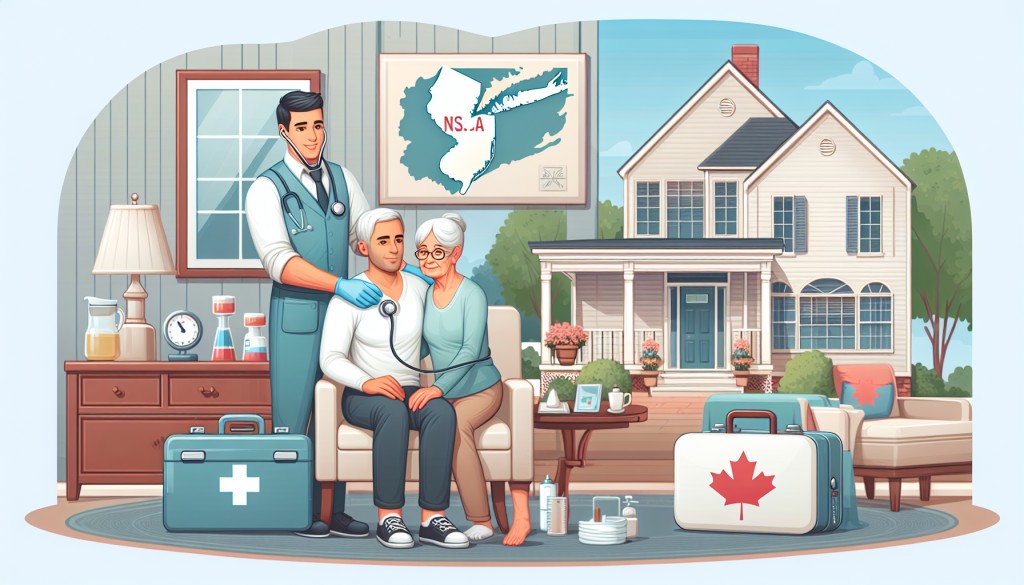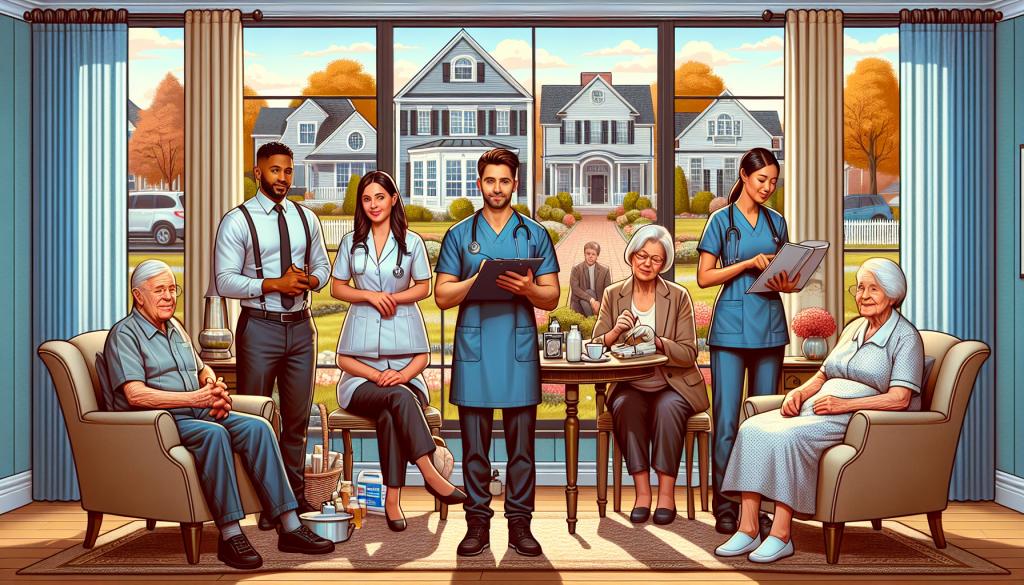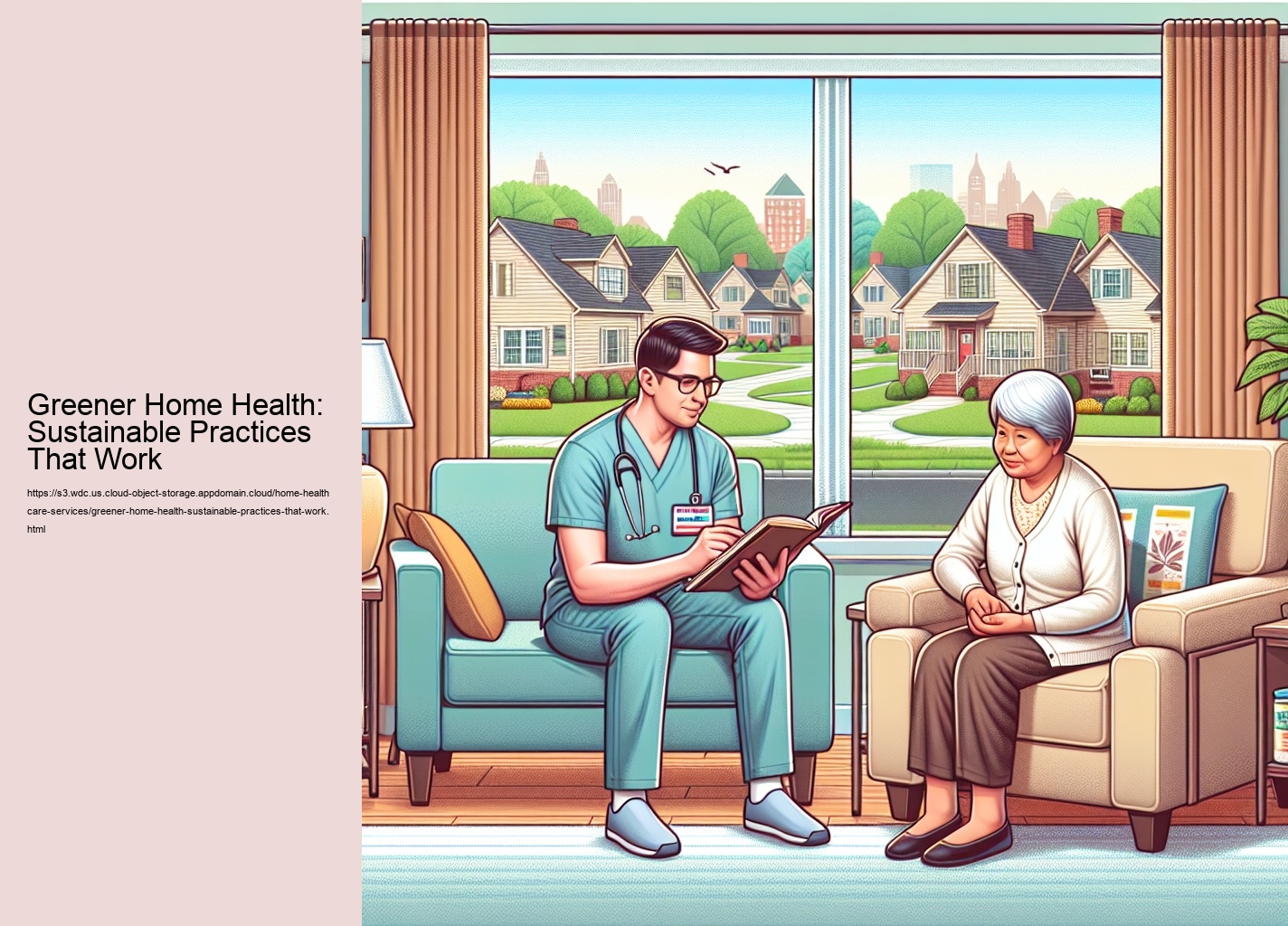Confirm Licensing, Certification, and High Quality Rankings
Before you authorize with any kind of home doctor in 2025, treat licensing, certification, and quality rankings as non‑negotiables. Insurance 101: Getting In-Home Nursing Approved . Begin with the essentials: verify the firm is correctly licensed in your state for the specific solutions you require. "Home health and wellness" (competent nursing, treatment, injury treatment) is managed in a different way from "home care" or "individual care" (bathing, dressing, friendship). Use your state wellness department or professional licensing board's online database to verify the company permit is energetic and in great standing, and that it covers the ideal service category. If the agency will certainly bill Medicare, verify it is Medicare‑certified; you can cross‑check this on Medicare's Treatment Contrast web site.
Certification isn't the same as a license, however it signifies the agency has met greater requirements and undergoes routine exterior evaluation. Seek valued certifying bodies such as The Joint Compensation, LAD, or ACHC. Ask for an existing certification certification and the day of the last study. For non‑medical home care, certification is voluntary; if an agency isn't accredited, they should be able to explain exactly how they keep top quality and oversight in its lack.
Do a deeper credential examine the people that will certainly be in your home. Registered nurses, certified nurses, physical and physical therapists, and social employees all have individual licenses you can confirm via state boards. Home health and wellness aides ought to meet state training needs. It's practical to ask the firm to validate that all team have passed background checks, are not on the government OIG Exclusions List, and bring proper professional responsibility and employees' settlement protection. Demand proof of the agency's general obligation insurance policy; numerous family members also request for a certificate of insurance upon contracting.
Use unbiased high quality ratings to contrast companies, not simply testimonies. On Medicare Care Contrast, review the star rankings and explore specific measures like prompt initiation of treatment, rehospitalization rates, renovation in flexibility and self‑care, and patient experience ratings from HHCAHPS studies. In 2025, Home Health and wellness Value‑Based Acquiring uses nationwide, so ask the firm to share its latest efficiency or result reports and what it is doing to boost. For Medicaid home- and community‑based services, examine your state's supplier directory for quality indications, vital occurrence reports, and EVV (digital visit confirmation) conformity data. On the internet reviews can be interesting but need to not override official quality information and regulatory records.
Demand openness. Ask the company for its most recent state study outcomes and strategy of correction, any type of CMS permissions or charges, and exactly how problems are managed. In a period of telehealth and remote tracking, ask about device security and privacy methods, HIPAA conformity, and whether any kind of electronic devices they make use of are FDA‑cleared where applicable. If the agency asserts medical facility or physician collaborations, confirm just how they share info, particularly if they integrate with your clinician's record system.
Red flags include incredibly elusive solutions regarding licensing or survey history, ran out accreditation, missing out on proof of insurance policy, unusually high staff turnover without description, or top quality scores well listed below local standards. A credible supplier will welcome these concerns, give documents rapidly, and assist you interpret scores in the context of your requirements. Verifying credentials and top quality up front takes time, however it is the most reputable way to safeguard risk-free, effective treatment in your home.

Evaluate Telehealth, Remote Tracking, and Information Safety
Evaluate Telehealth, Remote Tracking, and Information Safety
In 2025, choosing a home healthcare provider implies looking beyond bedside skills to the digital backbone that sustains your care. Telehealth, remote person monitoring, and information protection now identify exactly how practical, safe, and connected your care will certainly be.
Beginning with telehealth. Video clip check outs should really feel as trusted as a workplace appointment. Ask how easy it is to schedule, whether you can see the same medical professional for continuity, and what occurs if the connection goes down. Try to find functions like e-prescribing, safe and secure messaging, after-visit summaries, and language accessibility such as interpreters or inscriptions. Verify the system services your devices, sustains accessibility needs, and provides tech assistance for senior citizens or caretakers. Equally as essential is integration: does the telehealth system speak to your existing clinical documents so your health care medical professional sees updates? If care crosses state lines, confirm licensure and whether your insurer covers the solutions you plan to make use of.
Remote monitoring can change daily life for people taking care of chronic problems, recuperating after surgical treatment, or requiring safety checks. Focus on scientific worth and functional integrity. Which conditions do they monitor and with what devices? Are the tools FDA-cleared and validated for home usage? Who sees the data, how often, and what are the feedback times for irregular readings at night or on weekends? Ask just how sharp thresholds are set to restrict false alarms and exactly how commonly those limits are assessed. Inspect whether gadgets are lent or bought, who manages configuration, training, and replacement, and what cellular or Wi‑Fi connectivity is needed. Interoperability still matters here as well: will your information circulation into your health document, and can you see it in a client app?

Information protection need to never ever be an afterthought. A supplier's claim of "HIPAA compliant" is a baseline, not a differentiator. Seek independent audits or certifications (for instance, SOC 2 Type II, HITRUST, or ISO 27001), encryption of data in transit and at remainder, multi-factor verification, and role-based accessibility with audit logs. Ask about event reaction and violation notice treatments, just how typically they run safety drills, and their method to ransomware resilience and back-ups. For home devices, verify that information is encrypted on the device and throughout transmission, software program is maintained to date, and shed or stolen equipment can be from another location wiped. Clarify that possesses your information, how much time it's retained, exactly how to ask for removal, and whether de-identified data is made use of for analytics or shown to 3rd parties. See to it a Company Affiliate Contract exists between the technology vendors and the treatment provider, and that frontline staff are trained in privacy practices, including obtaining consent for any recording.
Lastly, take a look at the human side of the modern technology. Will they assist establish your Wi‑Fi or supply cellular kits if you don't have broadband? Do they supply clear guidelines, large-print materials, multilingual support, and caretaker training? Is there 24/7 technology support and a simple means to intensify clinical worries?
In a marketplace crowded with apps and tools, the most effective home healthcare solutions in 2025 blend high-grade scientific care with trustworthy online accessibility, workable surveillance, and extensive protection of your information. Pick the team that clarifies their innovation plainly, confirms their safeguards, and makes it simple for you and your family to use.
Examine Care Plans, Staffing, and Caregiver Fit
Selecting home medical care in 2025 ways looking past a glossy sales brochure. The best companion will certainly show you a clear treatment plan, trusted staffing, and a caretaker who genuinely fits your loved one's requirements and individuality. Start with the treatment strategy. Ask exactly how the company evaluates demands and sets goals: not just diagnoses, however useful abilities, drugs, fall danger, cognitive support, nutrition, loneliness, transport, and caretaker respite. A solid plan is composed by or under the guidance of a signed up nurse or specialist, with measurable end results (for example, fewer drops, boosted movement, drug adherence) and a timetable for testimonial-- usually every 30 to 60 days or after any adjustment in condition. In 2025, lots of agencies utilize remote patient tracking and telehealth; ensure the strategy clarifies what gadgets are used, who reviews the data, and how details is shown to your medical professional. Interoperability and privacy matter-- ask whether their systems link to your physician's digital documents, just how data is secured, and who can see updates.

Staffing is where promises fulfill reality. Clarify whether caregivers are W‑2 workers or 1099 service providers; employees generally have stronger oversight, training, and insurance policy protection. Validate credentials (CNA, HHA, LVN/LPN, RN), history checks, driving records if transportation is consisted of, booster shots, MOUTH-TO-MOUTH RESUSCITATION, and any type of specialized training like mental deterioration or Parkinson's care. Request their turn over rate, typical caretaker tenure, and fill price for shifts-- numbers that expose security. Continuity is important: will you have a main caregiver with a tiny back-up pool, or see frequent rotations? What is the backup prepare for sick days, no-shows, storms, or public health alerts? In a tight labor market, companies that pay fairly and use advantages often tend to keep team better-- do not be reluctant to ask exactly how they sustain caretaker well‑being and prevent fatigue.
Caretaker fit goes beyond availability. Share candid details concerning routines, language preferences, social or spiritual methods, animal comfort, smoking cigarettes level of sensitivities, music or food choices, and personality style. A great agency will make use of structured matching-- skills, language, social expertise, sex preference, driving ability, and physical capacity for transfers or equipment-- to recommend a caregiver and set up a meet‑and‑greet. Numerous will allow you attempt a short trial shift prior to committing. Observe chemistry: Does the caretaker pay attention, make eye get in touch with, and ask thoughtful concerns? Do they appreciate borders while being positive? If your loved one has dementia, try to find persistence, redirection skills, and a calm, reassuring existence.
Interaction ought to be basic and consistent. Ask to see the household portal or app if one exists: Can you watch browse through notes, jobs finished, vitals, and messages? Exactly how quickly does the workplace respond, and what is the acceleration path after hours? Who is your called treatment supervisor, and how frequently will they see personally to supervise care? In 2025, several states call for electronic go to confirmation-- confirm that clock‑in/ out protects you from billing for missed out on time, which your information is not utilized for anything else without permission.
Quality and accountability are nonnegotiable. Seek accreditation (Joint Payment, CHAP, or ACHC) and state licensure. Inquire about client satisfaction scores, complaint resolution time, event rates (drops, hospital stays), and any type of value‑based programs they join. Request two current client referrals with comparable needs. Testimonial agreement information thoroughly: minimum hours, cancellation terms, replacement guarantees, and what occurs if the caretaker isn't a fit. If you're using Medicare for skilled home health and wellness, clarify what is covered and for how long; for exclusive duty treatment, ask about long‑term treatment insurance coverage, Medicaid waivers, VA benefits, and whether the company can assist with documentation.
Practical safety questions round out the photo. Just how do they examine the home for threats and recommend equipment? Do they educate caregivers on safe transfers and infection control? What is the policy on cams in the home? If the caregiver will certainly drive your liked one, confirm insurance policy coverage and automobile standards.
Red flags include vague or cookie‑cutter care plans, no registered nurse oversight, high turnover, regular last‑minute schedule changes, unwillingness to share outcome data, aggressive sales tactics, or resistance to a meet‑and‑greet. Green lights include clear coverage, foreseeable staffing with back-ups, respectful matching, and a clear prepare for constant renovation.
Ultimately, the right selection feels both expert and individual. You ought to see a plan you can recognize, a group you can reach, and a caretaker your liked one anticipates seeing. If any kind of item does not feel right, keep looking-- fit, in home care, is whatever.
Contrast Prices, Insurance Coverage Coverage, and Contract Terms
Contrasting rates, insurance protection, and agreement terms is where most households either conserve thousands-- or run into undesirable surprises-- when picking home health care services in 2025. Treat this like you would certainly any kind of significant acquisition: need clarity, validate benefits in composing, and review the small print with a calmness, doubtful eye.
Beginning with rates. Ask each supplier for an itemized quote that matches your actual care strategy: variety of hours per week, level of caretaker (aide vs. LPN/RN), and any kind of specialized needs such as mental deterioration care, injury care, or post-surgical assistance. In 2025 you'll see a number of designs-- hourly prices, visit-based charges, live-in prices, and bundled "crossbreed" plans integrating in-person care with telehealth and remote tracking. Contrast apples to apples by consisting of attachments: minimum-hour requirements, overtime limits, weekend and vacation premiums, traveling or car park costs, registered nurse guidance or care administration costs, modern technology or gadget leasing, and fees for urgent scheduling. Ask exactly how often rates can transform, whether there's a price-lock period, and if boosts are linked to a fixed percentage or an index. Clarify what takes place when the care strategy modifications mid-month: do they pro-rate or re-quote? If you're taking into consideration a windows registry as opposed to a full-service company, consider your duty for pay-roll taxes, workers' payment, and responsibility-- what looks less costly upfront can cost extra in danger and administration.
Next off, pin down insurance protection. Know the distinction between medical home wellness (knowledgeable nursing, treatment, often covered if medically necessary) and non-medical home care (assist with showering, dishes, and friendship, commonly not covered by traditional medical insurance). For Medicare: knowledgeable home health and wellness can be covered when eligibility requirements are fulfilled, however individual care is commonly not, unless folded up into a strategy of treatment. Medicare Advantage plans progressively offer supplementary at home support, dish delivery, or remote monitoring-- advantages vary extensively by strategy, need in-network carriers, and might need previous permission or recertification, so validate limits, copays, and see caps before you start. Medicaid advantages and Home- and Community-Based Solutions waivers can be generous but differ by state and handled care strategy; waiting lists and company networks matter. Long-lasting treatment insurance coverage can fund substantial hours when profit triggers are satisfied (normally requiring assist with two or even more activities of daily living or cognitive problems), however see removal durations, everyday or regular monthly caps, and life time maximums. Experts may get Help and Participation or Homemaker/Home Health Aide services via the VA. Ask if the company will certainly confirm benefits, deal with permissions, and expense directly, and whether they'll continue care if permissions lapse. If you prepare to self-pay, inquire about discount rates for longer routines, autopay, or packed programs. HSAs and FSAs can usually be made use of for medically needed services; for tax obligation reductions or credits, seek advice from a tax specialist.
Now, the agreement terms-- the part the majority of people skim and later remorse. Seek:
- Discontinuation and notice: Can you pause or terminate without penalties? Are there minimums or early discontinuation charges?
- Auto-renewal and rate changes: Just how are boosts connected and topped?
- Staffing and replacements: How quickly do they change a caretaker that's sick or otherwise a fit? Is there a test period or satisfaction assurance?
- Non-solicitation and buy-out: If you want to hire a caretaker directly later on, what cost uses?
- Worker status and insurance: Are caregivers W-2 workers covered by workers' compensation and liability insurance coverage? Ask for evidence.
- Scope of practice: What jobs can assistants legitimately perform in your state (drug administration, transfers, catheter care)? That supervises and exactly how usually?
- Documents and transparency: Will you have access to digital go to logs, care notes, and reassessments? That updates the treatment strategy and exactly how regularly?
- Payment cycle and disputes: Down payments, late fees, reimbursements for extra hours, rounding rules for shift start/stop times, and the process for disputing a bill.
- Security and personal privacy: Case coverage, infection control, background checks, driving plans, and information personal privacy for any remote surveillance tools.
- Disagreement resolution: Arbitration provisions, place, and your rights under state consumer regulations.
Do an easy "true cost" comparison across finalists: predicted weekly hours x price + all anticipated fees-- validated insurance policy compensation. Then layer in non-financial worth: responsiveness, back-up coverage, supervisory quality, and outcome tracking. In 2025, reliable firms can show top quality metrics and might take part in value-based programs-- ask for their a hospital stay reduction rates or customer contentment ratings.
Before finalizing, obtain every assurance in creating, including start date, caretaker qualifications, and the exact solutions covered. If the contract really feels dense or one-sided, have actually a relied on advisor or attorney examine it. The most effective deal is not simply the most affordable price-- it's the arrangement that delivers risk-free, trustworthy treatment with foreseeable costs and no surprises.
